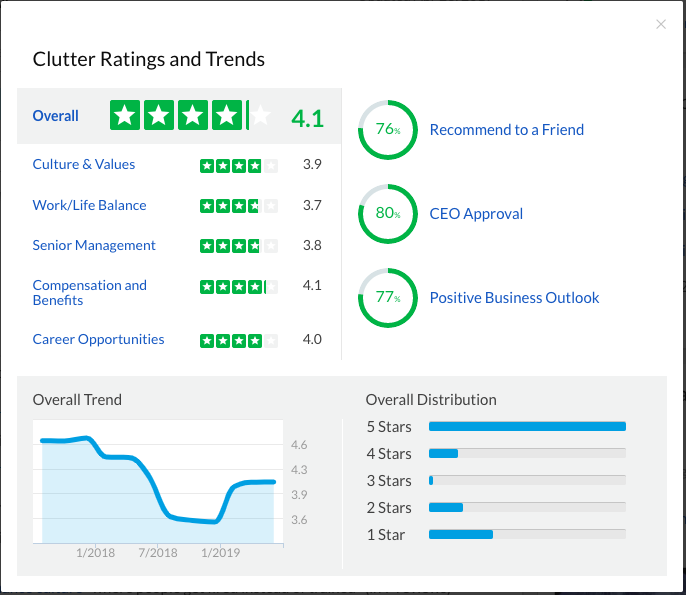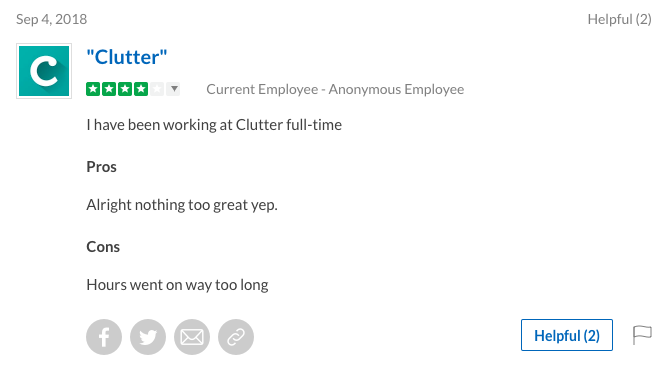Clutter- a bit of a mess right now
Jul 8, 2019
So far, we’ve looked at Clutter’s:
Business Model
Cost and Revenue drivers
I’d like to take some time to dive into the health of the company from an employee satisfaction standpoint.
Clutter is a fast-growing, venture-backed company, and so is subject to growing pains
Full disclosure, I worked at a fast-growing startup in the SF Bay Area called Zenefits. For context on how fast it was growing, I joined at about the 300 employee mark, and in 6 months, I believe we were celebrating passing the 1000 employee mark and breaking ground for a new Arizona office.
This experience had its ups and downs. For anyone interested in the Zenefits saga, I like to direct people to William Alden on Buzzfeed, whose coverage, in the moment felt personal and directed, but in retrospect I have to admit was on the money.
Fast-growing companies have stress points. This is commonly referred to—and brushed off—as “growing pains”.
Sometimes the growing pains are breakdowns in communication between teams or a dropped handoff between Marketing and Sales. Sometimes the growing pains are new leaders clashing with old leaders on “the way things have always been done” vs “how they should be done”.
And sometimes the growing pains are stealing employees’—excuse me, independent contractors’—wages. Sometimes they are shutting down with so little notice that vendors are left asking the question whether they were intentionally left unpaid. Sometimes they are holding layoffs right before the company IPOs.
Clutter’s Glassdoor is a mess that they need to clean up
If you look at the company’s Glassdoor, you’ll see a fairly rosy 4.1 overall. But if you click into the handy little Ratings and Trends tool, you’ll see that over 2018, the company took a nosedive.

Here are some highlights:
Nobody listens to you. You’re a body that they will grind until you say uncle. Once you do, they’ll replace you faster than they hired you. You’re just a pulse to get a task done.
Hire and retain more females and underrepresented minorities, they too have college degrees and perfectly functioning brains.
Customers have been leaving the Clutter nest for more traditional storage offerings. That is not a good sign. The “churn” ratio has not been kind to the company. The business plan here, once though to be great, will fail in the end.
Just all of the 10+ cons listed this review. Pastebin here for easier reading of the list)
As an aside, you can also see a string of reviews in early September that were all 5 stars. Why is it that HR or whoever is tasked with leaving positive reviews never tries as hard as employees leaving negative reviews?
As an aside to an aside, I wonder if there’s any potential in a cottage industry popping up around brushing company Glassdoor reviews? Pay me $50K for 1 month and I’ll come to the office and work, and leave a couple of glowing positive reviews at random times citing different aspects of the culture
Lastly, can I just say that this review is hilarious?

Risks of having disgruntled employees
Disgruntled employees work less hard and spend more time looking for other jobs
Disaffected employees encourage—either explicitly or by example—other employees to leave as well
As those employees leave, customers typically get forgotten in the handover and get “email undeliverable” responses
The company pays switching costs as they bring on new employees to replace the ones who left. This effect is multiplied with employee seniority and tenure
If the Recruiting team are unhappy, they are not being as selective and potentially bringing in bad fits, which only serves to increase the speed to switching cost. They may also be turning away good fits. This effect is multiplied with each recruiting interaction, regardless of hire/no-hire decision
As employees leave and write Glassdoor reviews, it makes it harder to bring in the types of employees a company needs and the company enters a downward spiral
The fault doesn’t lie with the employees, but with the company
I take pains to say here that none of the above points should be blamed on the employees. I believe that managers+ (“+” meaning higher-level such as VPs, Directors, and C-levels)should be concerned primarily with the wellbeing of their direct reports.
Good managers+:
Understand the difficult parts of your job. They don’t have to know everything about your job, but they have to understand and respect the hard parts of it
Care about your growth and wellbeing. Good managers+ have faith that they hired a smart, talented, resourceful person, and recognize that they are essentially gardeners
Know how to listen. And by knowing how to listen, I mainly mean shutting up first